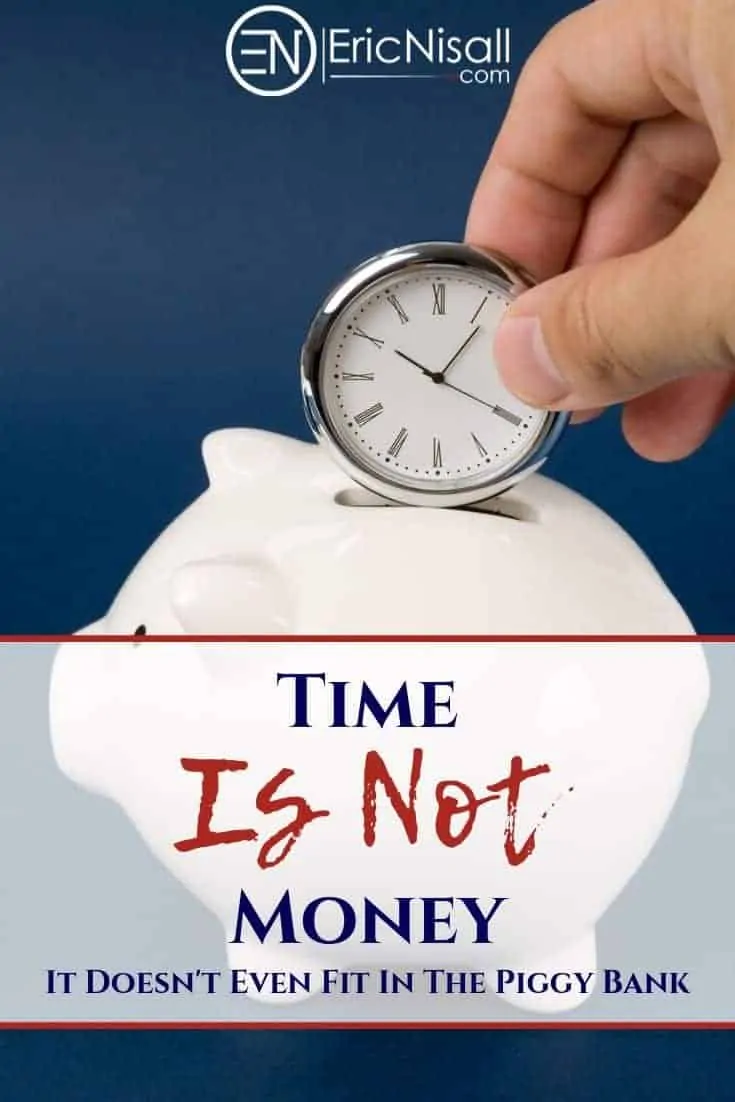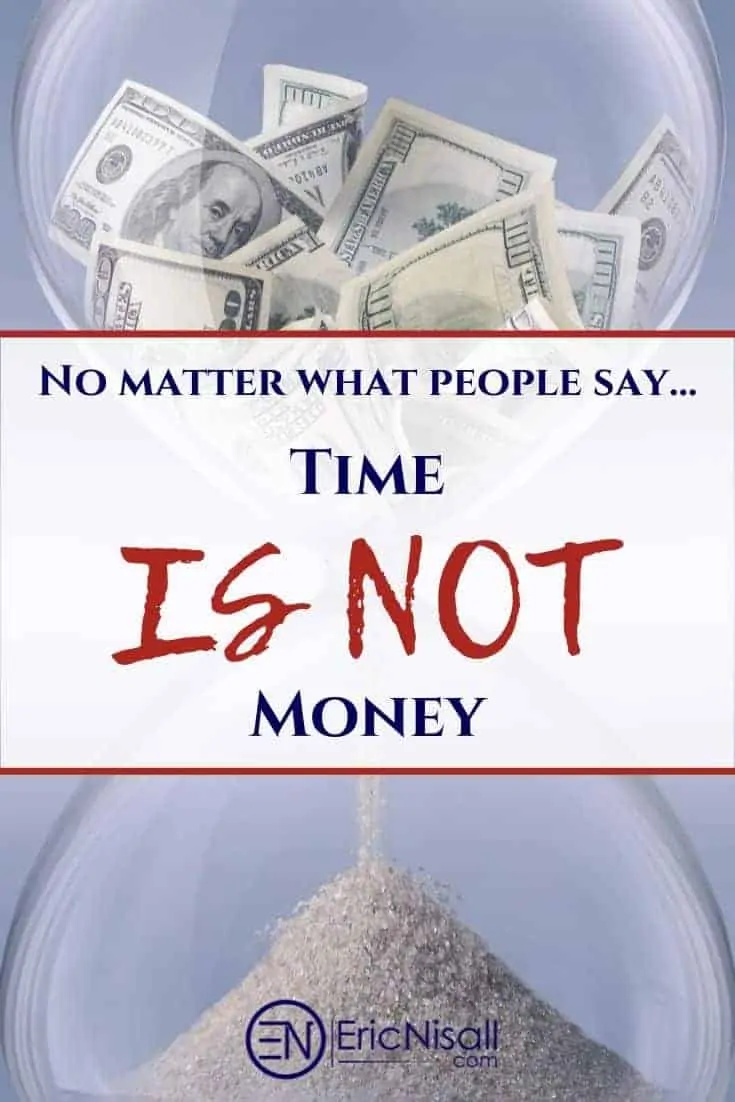No, Time Certainly Is NOT Money!
This post may have affiliate links. Please read the Disclosure Policy for complete details.

I’d like to thank whoever used the phrase “time is money” in the current context.
You’re an idiot.
Yeah, yeah, I know Ben Franklin was the original author.
That was sarcasm.
And it wasn’t his intent to have it twisted to its current usage.
Anyone who lives by that quote is almost as big a fool.
This isn’t In Time (although it was a pretty cool movie).
Time isn’t currency.
It isn’t even a tangible commodity.
In the world we live in, time is one thing and one thing only: fleeting.
There is no way to create it, nor is there any way to get it back once it has been used (or wasted).
It isn’t like money which can (and most likely will) be earned back on your next paycheck should some be wasted on something frivolous or disappointing.
There’s no time store where you can go in and pick up an extra decade to make up for past foolishness.
You can’t take it from another person and add it to your own timeline.
You can’t mortgage another part of your life to acquire a little more.
You can’t even “save it for a rainy day”.
Once it’s gone, it’s gone forever. PERIOD!
So why do people insist on putting a value on time?
Beats me, but I can tell you why it’s just wrong to do so.
My salary determines how much my time is worth
Most of the time, when the conversation turns to valuing time, people fall back to a very flawed line of reasoning: their employment compensation.
Why is it wrong?
Because you are only worth that amount of money when you are doing that specific task for that specific employer.
Your value to your family, friends, society, whoever is going to be different that what your value is to your employer.
Hell, your value to a different employer for that very same task is going to be different.
This misconception also applies to people who base the decision of what activity to outsource around the home.
It revolves around the concept of opportunity cost.
Pay someone to mow the lawn so you can go to the park and play catch with little Timmy?
Oh, no the service costs more than your own “salary value” so he’ll have to wait while you do it yourself.
In this case the faulty logic is that you wouldn’t be earning that money at that specific time anyway, so it’s a non-factor.
You can only accurately use this reasoning if the decision was between going to your normal job for which you make that salary or doing something else.
Otherwise, your salary has no bearing on the matter since you wouldn’t possibly get paid for that time (unless you have some magic job that you can show up to whenever you please and get paid).
Besides, it’s not like spending time with your kid in their formative years is valuable or anything….
I will have to work how long to afford that?
There was something recently posted where the contributor made a statement about valuing time with an example of buying a bike for $500 with a job that pays $15 an hour.
Her logic was that some people would determine that it would take 5 days of work to pay for the bike, and wouldn’t want to commit a “whole week’s worth of my hard-earned income on a new bike”.
I would counter by saying that it may cost 5 days worth of “hard-earned income”, but the enjoyment and/or health benefits returned would be exponentially more than that equivalent of “value”.
People tend to be short-sighted when it comes to money, and especially when it comes to time.
Valuing things, no matter what they may be, in terms of how much time it would take to earn the money for them is ignorant.
It’s similar to the obsession with savings where so much focus is on accumulating money that it can often go unenjoyed.
Time is very much the same: it slips away while you try quantifying its value, and that obsessing will have been for nothing.
How much is your sanity and mental well-being worth?

Well to some, their personal time can’t be accurately valued in terms of money.
An excellent case is another accountant I came in contact with during tax season.
He handled a partnership I need info on for an individual client of mine, so I called his office after hours one evening.
The next day I got a response and he said that he doesn’t work weekends or after-hours during tax season.
His reasoning was simple: “I do what I can during business hours, then I go home to spend time doing the things that I enjoy the most and with my family”
How can he say something like that during the most harrowing time of the year for accountants?
I say it’s easy–there are more important things than money with time being at the top of the list and I agree with him 1000%.
I would much rather spend my time doing things I enjoy instead of under the stress and headaches caused by people and their ignorance/selfishness, especially at tax time.
You don’t get paid for sitting around
Let’s not forget about the fact that people aren’t productive 100% of the time they are awake to begin with.
This fact alone negates the reasoning for putting value on time for every single task or opportunity in life.
It just isn’t possible to quantify and value every single second and activity.
How much do you value your sleep time?
How about eating, do you forego that because it isn’t cost-effective?
Get real people.
Time is a luxury that we don’t have enough of.
Stop wasting it trying to put a value on it for every possible decision.
Try learning to enjoy it more and worry about the monetary side less.
Think I’m wrong?
Try this on for size: think about how much you miss a departed friend or loved one.
Now think about what you would give to be able to spend one more day, one more hour, one more minute with them.
See, there’s almost nothing that you wouldn’t give just to get those few fleeting moments back.
That is how time should be considered, not as a commodity, but as something that should be valued and cherished.
Trust me, I’ve gone through an experience like that in my own life where I gave up money to spend my time a different way.
Your Turn
So, tell me again how time is equal to money and how it should always have a quantifiable value? Tell me how each task we do should be valued the same by everyone else. No, seriously, tell me all about your view in the comments below!

The concept of passive income suggests that time can be converted into money, right? So if you have capital you do get paid for sitting around.
Technically true, no argument from me, but it’s a different application. Passive income argues that point in a different context, but that’s not how the majority of people address the “time is money” relationship. I’m using that argument directly at people who use their “job” salary as a valuation point.
Time is money. Once you spend it it is also gone forever (just joking). Well, it is considered that way, because our society counts everything in money. Some guys in Amazonian forest they don’t have this problem at all.
Yeah, but the Amazonian forest guys also don’t toss that crap around the internet like the rest of us either. On the other hand, they probably do have the same problem, but rather than money they deal in fish or something similar.
haha, that’s true. Maybe they say “Time is fish”.
I posted something different 2 days ago, with one of my 3 examples of time and money being how many hours someone works to buy something. Even more eye opening is how many hours one worked for the savings to buy something.
Overall, the primary idea from my perspective is that time is more valuable than money. We can always make more money, but we can’t make more time. Thus, if we use that precious time for money, in order to buy something, it’s effectively like trading time for something material. Often it takes much more of our time to buy something that we might realize.
Where I agree with you here is the benefits of something might have value that might not seem apparent right away, but reveals itself later. Like the bike example. A bike purchased for $200 might bring hundreds of hours of enjoyment later, which more than make up for the amount of time worked to buy it. On the other hand, paying $200 for an expensive dinner probably won’t have the same long-term benefit.
For sure. I think too many people are short-sighted and can’t see how something would be worth more in the long-term than it cost in the near-term. Especially when it comes to that bike example, not only can the enjoyment be valued more than the actual acquisition cost but the health benefits can make future time more “valuable” as well.
Like I said on your post with the vacation example–sometimes it isn’t even a measurable result. Memories or experiences can more than outweigh the “cost” of earning the money it takes to get to there.
actually the proverb is not to equate the two. It merely indicates that wasting time is similar to wasting money or wasting opportunity. At least this is what I learned in my country from my teachers. Don’t know what people here would think..
Somehow, someone came up with the phrase “time is money” and it has almost become a mantra for as long as I can remember. I would agree that the two should not be equated. Unfortunately, many people are misguided in their thinking, and often times take things out of context or simply don’t understand such things.
Well put Eric. I always thought that if people think time is money, then they would never jump into blogging. I think time is way more valuable than money. This is why I work on my blog and do other things once my wife and kid go to sleep. I would rather spend time with them.
For many, I would suspect that certain pursuits like blogging are simply ways of expressing themselves and having their voices heard. I honestly don’t have an issue with placing importance on money-making ventures, but when people place higher priority on those things over other things like friends & family (or even trying to place a value on those intangible things) to me it seems like the priorities are way out of whack.
Time is the most valuable commodity we have. Sad part is most of us don’t realize it until it is gone! Just ask any Parent who has just dropped their child off at college. Each of us must decide what we are willing to barter our time for, an extra 20 minutes in traffic for the new home or family over preparing for the U.S. Open as Phil Mickelson chose. For someone living in poverty, time may very well be money as far as they are concerned. If they don’t work they don’t eat. I think your own personal situation dictates how you value time.
You must have read my mind, Paul. I was seriously considering working the Lefty thing into the post, but ultimately decided against using such a public profile for fear of having that become the prime focus.
There was a Baltimore Ravens player who came out recently speaking against fans who questioned his dedication to the team for not showing up to “optional” activities. He said that they didn’t need to see him all of the time and that there were certain things that he needed to take care of like being with his young children in the offseason, and that even if he wasn’t seen publicly preparing for the season it was getting done. Some people just get it while some don’t.
I appreciate this article. I just got done reading the opposite of this idea. I was thinking of time and money in a quantifiable way and found and article which suited that ideology perfectly. I then somehow stumbled upon your article and you’re so, so right. You just reversed my whole core thinking on time and money and I just want to thank you.
Hey Matthew.
A lot of people try to quantify time. What really gets me is that they use their “working” value to apply to home life like cutting the lawn or DIY repairs.
Everyone is entitled to their own opinions!